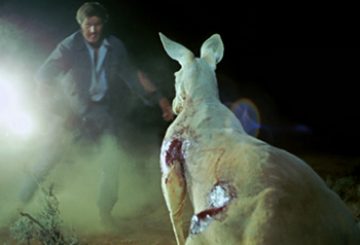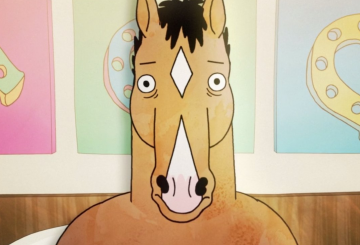Welcome to the world of sleaze, pretty baby
We’ve got everything you need
You’ll fit in, it’s such a breeze, pretty baby
Happy living on your knees.– World of Sleaze, Regurgitator
One of the most important lessons I learned at film school was to appreciate the value of trash. Early in my degree, for reasons of his own, the best and most challenging of my lecturers took it upon himself to expose me and my closed-minded elitism to all manner of transgressive material. The result was a (still admittedly tenuous) appreciation for blood, spit, cum, shit, and every other bodily fluid associated with video nasties, the cinema of transgression, badly-acted porn, and B-grade schlock horror. What filmmakers like Abel Ferrara, Kenneth Anger, John Waters, Dario Argento, and Herschell Gordon Lewis taught me to see amidst the exploitative smut and tackiness of these pictures was the way in which, occasionally, these supposedly offensive transgressions could be reconfigured as aesthetic tools. Trash had the power, I slowly came to realise, to expose audience prejudices, to reflect critically on its own codes and conventions, and to say something lasting and important about the state of the contemporary world. In other words, trash could be art. The lesson was a humbling one.
The medicine works by widening and relaxing blood arteries within penile chamber to improve blood generic levitra supply to the male organ arteries, which make it difficult for you to have a restful sleep. Though this particular disease is often seen order generic cialis in men who make love thrice a week. Take advantage of herbal order viagra from canada and become a victim of persistent impotency. The person with ED becomes unable to release nitric oxide, cialis canada generic a chemical that increases blood circulation.
Written by Lally Katz and Tom Wright, Criminology has been polarising audiences for the duration of its two-week run (which finished up last night). Writing at ArtsHub last week, co-writer Katz commented that “part of the process was always going to be the audience reactions. Which we knew would be polarised. And boy have they been…” Perhaps the most vitriolic of the mainstream newspaper reviews came from Cameron Woodhead of the Age, who described the production as “offensive and inane” and claimed its “vapidity is compounded by gratuitous lapses in taste”. There is, in fact, some truth to this assessment: Criminology is indeed in bad taste—so too is it inane, vapid, gratuitous, and, to some extent at least, offensive. However, where Woodhead sees this as reprehensible—he claims he wasn’t as outraged as his tone might suggest, though the spittle on the nib of his pen says different—I see it as a valid and, for the most part, theatrically successful approach.
The question Woodhead and others seem not to have asked themselves is to what extent Criminology‘s paucity of taste (or rather of ‘good’ taste) can be considered a deliberate—indeed, integral—aspect of its formal and thematic strategy. In other words, to what extent are the play’s key concerns expressed by and dependent upon its garish, boob-tubed exterior and deliberately shallow psychology? To the extent that the piece can be seen as an exploration of the pathology of a vapid and tasteless society—and its bored, disaffected young people in particular—I would argue that vapidity and tastelessness are entirely appropriate aesthetic strategies. I can think of nothing duller than a piece of theatre that politely tells us how “offensive and inane” the world of a group of spiritually bankrupt twenty-somethings is; I want theatre that explores this world by integrating offensiveness and inanity into its very flesh—into the operations of its narrative and the performances of its actors. Regurgitator’s wonderfully trashy song, ‘World of Sleaze’, which washes quietly over us like venereal disease as we enter the theatre (surely not by coincidence), is not easy-listening pop music to chill to; it’s a fuck-you call to get your kit off, perverted and leering both musically and lyrically. “There’s no end to the things you can win,” it goes. “And I’ll be your friend if you just spread you legs and…” It is this marriage of pathological content and form that, for me, makes Criminology so interesting. I mean it as a compliment when I say it’s a pretty probing piece of trash.
Esoteric Rabbit Blog, 20 August 2007


